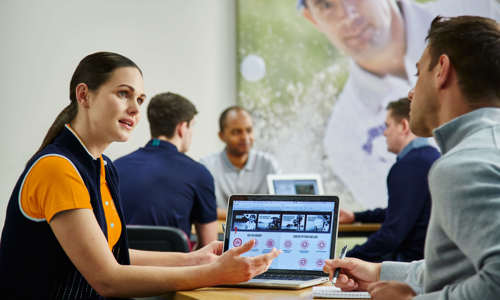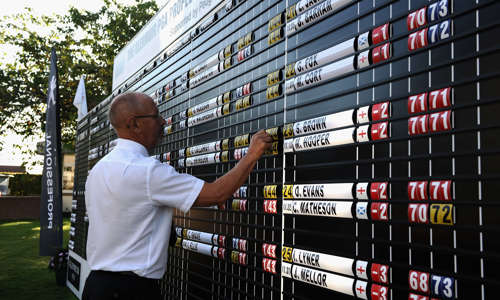The PGA Master Professional has spent most of his career in Sheffield working with juniors who are new to the game and now coaches students with special needs – two of whom have won medals in Olympic competitions.
Few of us could ever appreciate the years of effort, dedication and courage it takes many of the competitors to even get to the 1st tee of the recent Special Olympics World Games in Berlin. PGA Master Professional Pete Ball is one of the few who does.
The Sutton Coldfield-born Professional, who has been in Sheffield since 1987, has been working with golfers with special needs for 40 years now. At the beginning there was nothing in place other than a set of rules from the R&A stating they now had inclusion, but even that was very rudimentary.
Ball previously worked for the Cheshire Homes charity and did his Duke of Edinburgh award, helping people with difficulties, and he’s been passionate about it ever since.
“That put me on a track where people needed help and I was in a position to help them,” says Ball with modesty.
One huge highlight on Ball’s lengthy and highly impressive CV is that he played a big part in Danny Willett’s development when he coached him as a teenager at Birley Wood in Sheffield. Willett would come from the moment that he finished school until it was too dark to hit any more balls. Ball’s working day was long done but he would stay behind to help and encourage a young Willett as he began to make strides in the game.
“If you have a young person who wants that help, you have to be there to create that opportunity. You can’t go home.”
But Green Jackets and Ryder Cups pale into relative insignificance when you consider what Ball, and his son Alex, have done over the past 20 years with Alex Thompson and James Bailey.
Thompson has XXY chromosome disorder, is blind on his left side and has little to no hearing. He has to make a lot of adjustments just to be able to play. He has to work around what he can do to meet his needs, and at 6ft 6ins he has long levers to get in the right place.
Bailey is autistic and has no concept of time or lessons. They’ve been working together for 20 years but he only thinks that he’s been playing golf for a couple of months. To change one aspect of his swing might take a year, just saying the same thing over and over and gradually working through it.
Thompson came home from Germany with a gold medal, Bailey a silver.
Bailey’s back story is a little different and equally as humbling. Change with autistic children is incredibly difficult and Bailey’s golfing began on a school field before moving to the practice ground and then the range.
“To get James on to a course was a problem as he didn’t see that as golf, he didn’t see that playing a hole was playing golf as he thought it was hitting balls on a range. So we had to walk him through the process of three holes to six holes and then he would quit after nine so the back nine was alien.
“Then think about having to play a different course and getting in a car and playing somewhere new. Then we had to teach him to go into a clubhouse where people are who he didn’t know and it was noisy which a lot of autistic kids don’t like.
“We had to change his idea of fitness and he’s now fitter than ever – he does boxercise and they gave him the person of the year because of his efforts. I’m so proud of what he’s done as it is so different, people around him find it amazing.”
Golf-wise, there have been similarly unique adjustments which have now given Bailey a current Handicap Index of 26. Ball is quick to point out that his own son, Alex, has played a huge part in Bailey’s development, acting as his PA as well as his coach four times a week.
“Putting wise, he aims off the green and hooks everything and that’s how he sees a putt, he will shut the face and hook the ball across his feet. If we try and straighten him up he will miss every putt so it’s a case of refining things. He had a putting lesson at Wentworth with a pro and he tried to tell him to stand square with a square clubface square. We explained that he needs to aim right and James knocked four putts in from 10 feet on the trot and the pro said let’s leave it at that. He couldn’t fathom it.
“And he will aim miles left off the tee so try and explain that one to me. People have thought that I couldn’t have been much of a coach as we were still working on the same thing, sometimes 18 months later.”
It’s a long way from Birley to Augusta
Pete Ball was Danny Willett’s first coach, working with him – and thousands of other youngsters from inner-city Sheffield – at municipal course Birley Wood.
“Danny first came to Birley at the age of 11. He came along with his school initially. “I think he’d hit some balls before he came to me but not very many so we were starting from scratch.
“He progressed to the after-schools class and then he started coming every night.
“I remember us having a chat about his technique and saying we needed to get his body working a bit more efficiently to hit the ball better.
“We built it from there. And he just got better and better. Danny had slightly more going for him than most but not much.
“It’s a tough area where his father worked. Hats off to him for working around there.
“It’s the steel inside them. They’ve had to fight for what they want. And that’s what makes them very hard people. Very determined people. What do they say – a hungry fighter is a dangerous fighter.
“When he got to 15 or 16, we needed another coach.
“I said to him as I do with all the kids: ‘You’re 16 years of age, I’ve done the best I can but you need a full-time coach now and I’m not going to be your full-time coach.’
“I always explain to parents from the outset that my job is to get young people to have some fun, learn a skill for life and use it for life as best they can.
“My idea with all my players is to get them to 16 and then encourage them to leave the nest. They’ve got to make that flight on their own. Not with me. My job’s done. I’ve given them whatever skills I have and created an opportunity with them to do what they want to do.
“I always say I’m a lucky coach, not a technical coach.
“We discussed who Danny would like to work with as a full-time coach, he said Graham Walker. I said, great choice. He knows my coaching methods and he’s an expert technical coach which I’m not.
“He was scratch or plus one at that stage. But he was driven. A couple of years later, he came back from Jacksonville and I did some mentoring with him. He didn’t want to go back to college, he wanted to go to tour school.
“We had an interesting conversation at that stage. My idea was finishing his degree but his idea was going to win tour school. I tried to explain it wasn’t that simple but he said it would be. I knew that fixed mindset was there. Then he rang me up and said he’d won in Germany. Then that he’d won in Spain. I said OK, you’ve got your tour card, are you happy now?
“On the last day of the Masters, I was away from home on PGA business. I got a phone call from my son. He said: ‘Danny’s about to win the Masters.’
“So I put the TV on and he was on the 16th so I watched him play the last three holes and put the Green Jacket on.
“I wasn’t nervous. I knew he’d finish it. I was very proud of the lad. What he’s done was incredible.
“It’s a long way from Birley to Augusta. I smile when I think about it – playing a windswept muni in the middle of winter to playing Augusta. That’s a huge journey that very few could even dream that could happen let alone let it happen.
“But we were the closest club to him and statistics say your chances of becoming a star are down to facilities, good parents, good schooling – it’s a combination of things.”






































